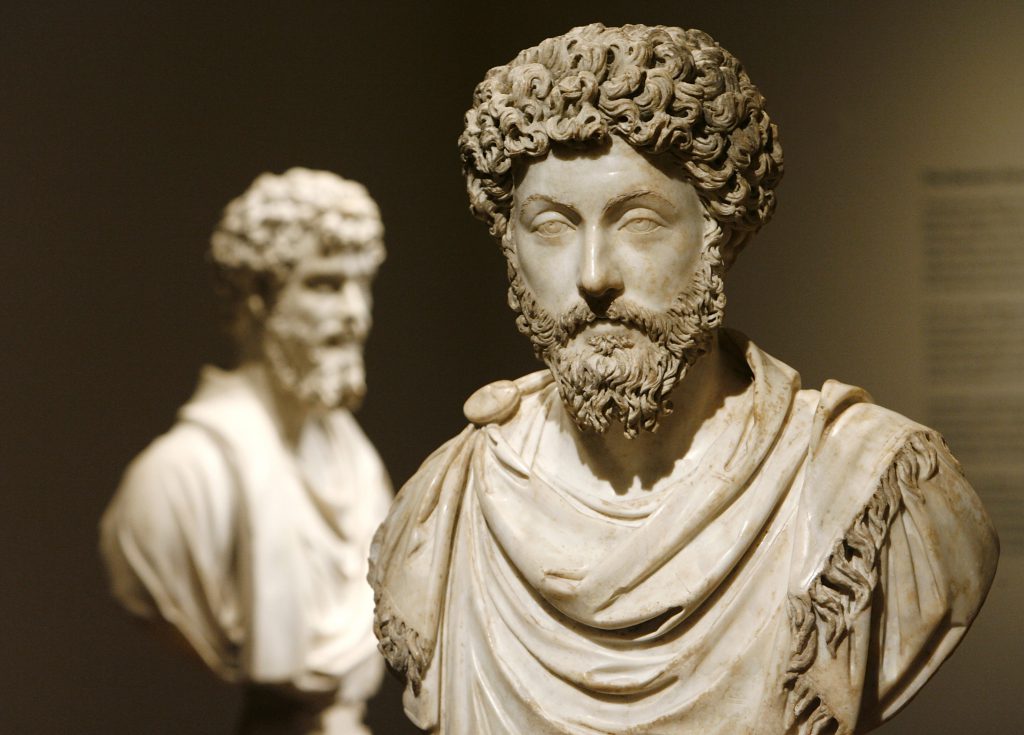Stoicism: Nature and the problem of evil
Stoicism, an influential school of thought from ancient Greece and Rome, is renowned for its focus on virtue, self-control, and the pursuit of wisdom through understanding the natural world. It originated with Zeno of Citium and later expanded through the works of Epictetus, Seneca, and Marcus Aurelius. At the core of Stoicism is the belief that the natural order is rational and that humans can develop virtue by aligning themselves with this order. In this post, we will discuss the problem of evil within the Stoic worldview, touching upon determinism, reason, human emotions, and Stoicism’s lasting impact.
i. Determinism and the Good in Nature
Stoic philosophers believed in a deterministic universe, suggesting that everything that happens is predestined by fate. This idea stems from their understanding of the cosmos as a logically ordered system. The Stoics posited that nature, or the cosmos, is governed by divine reason, also referred to as logos. This rational principle directs the course of events in the universe, functioning in a predetermined and structured way. As a result, Stoic philosophers argued that everything happening in the natural world is fundamentally good since it adheres to the rational order of the cosmos.
This deterministic view significantly influences the Stoic perspective on the problem of evil. Given their belief in the inherent goodness of the natural order, Stoics claim that genuine evil does not exist in nature. Instead, they suggest that the perception of evil stems from misunderstanding the natural order or from faulty human judgments. According to Stoics, evil is a product of the human mind rather than an innate characteristic of nature. To live a good life, Stoics believe it is crucial to align oneself with the cosmos’ rationality, which allows individuals to recognize the inherent goodness in all events, even those that might seem evil at first glance.
The Stoic comprehension of determinism also has consequences for the notion of free will. Although Stoics accepted that human actions are determined by fate, they maintained that individuals can use reason to shape their reactions to external events. This means that while the events themselves are preordained, people have the power to decide how they respond to these events. In this sense, Stoicism provides a distinct viewpoint on the connection between determinism and human agency, highlighting the role of reason in molding one’s moral character.
By acknowledging the deterministic nature of the universe, Stoic philosophers aimed to foster an attitude of acceptance and tranquility when confronting life’s adversities. They argued that since events are predestined, there is no use in resisting or regretting them. Instead, individuals should concentrate on comprehending the rational order of the cosmos and use this insight to create a virtuous and harmonious life. This attitude of acceptance and inner peace is fundamental to Stoic thought and continues to resonate with those seeking to lead a meaningful life amid life’s unavoidable challenges.
ii. Reason and the Life of Virtue
A core tenet of Stoic philosophy is the belief that humans can use reason to understand the natural world and cultivate virtue. Stoicism posits that the ultimate goal of human life is to achieve eudaimonia, a state of happiness and fulfillment derived from living in harmony with nature. According to Stoic philosophers, the key to achieving eudaimonia is the cultivation of virtue, which they define as living in accordance with reason. This focus on reason reflects the Stoic conviction that the rational principles governing the cosmos can also guide human behavior, enabling individuals to lead virtuous lives.
Epictetus, a prominent Stoic philosopher, placed a strong emphasis on the importance of concentrating on the things that are within our control, such as our own thoughts, emotions, and actions. He maintained that external events, which are determined by fate, should not be a source of distress, as they are beyond our control. Instead, we should use our reason to respond to external events in a virtuous and measured manner. This entails developing a deep understanding of the rational principles that govern the universe and using this knowledge to guide our actions and emotions.
Seneca, another influential Stoic thinker, similarly argued that reason can help individuals to develop resilience in the face of adversity. For Seneca, adversity is an opportunity to practice virtue and strengthen one’s character, ultimately leading to a more fulfilling life. He believed that by employing reason to evaluate and respond to challenging situations, individuals could cultivate emotional resilience and equanimity, allowing them to persevere through difficult circumstances without succumbing to despair.
In addition to Epictetus and Seneca, Marcus Aurelius, the Roman Emperor and Stoic philosopher, also highlighted the importance of reason in the pursuit of virtue. In his Meditations, Aurelius wrote about the necessity of using reason to guide one’s thoughts and actions, emphasizing the need for self-reflection and self-awareness in the process of personal growth. By examining one’s own beliefs and motivations, Aurelius argued that individuals could align themselves with the rational principles of the cosmos, thereby cultivating virtue and living in harmony with nature.
The emphasis on reason in Stoic philosophy extends beyond the personal realm, as it also has implications for social and political life. Stoics believed that the cultivation of reason and virtue could lead to more just and harmonious societies, as individuals guided by reason would be more likely to act in the best interests of their communities. This idea reflects the Stoic commitment to the principles of justice, wisdom, courage, and temperance, which they viewed as the four cardinal virtues essential for a flourishing life.
iii. Human Passions and Moral Evil
While Stoics believed that the natural world is inherently good, they acknowledged the existence of moral evil, which they attributed to the human passions. Passions, such as anger, fear, desire, and envy, are irrational responses to external events that can lead to morally wrong actions. Stoicism teaches that individuals can overcome these passions by using reason to understand the natural order and by focusing on cultivating virtue.
According to Stoic philosophers, the root of moral evil is ignorance of the natural order. As a result, they advocate for the pursuit of wisdom and the cultivation of reason as essential steps in overcoming human passions and moral evil. Epictetus emphasized the importance of self-discipline in mastering one’s emotions and desires, arguing that individuals have the power to control their internal states and, consequently, their moral character.
The process of overcoming human passions and moral evil in Stoic thought involves a shift in perspective and a reorientation of one’s values. Stoic philosophers maintained that individuals should focus on cultivating inner virtues, such as wisdom, courage, justice, and temperance, rather than pursuing external goods like wealth, power, and fame. By prioritizing the development of virtue over the attainment of material possessions, Stoics believed that individuals could free themselves from the grip of irrational passions and live a more fulfilling and morally upright life.
One of the practical techniques employed by Stoic philosophers to counteract the influence of human passions is the practice of negative visualization. This involves imagining potential negative outcomes or setbacks in order to mentally prepare for adversity and develop emotional resilience. By contemplating potential challenges and practicing acceptance, individuals can develop a more balanced perspective on their circumstances and reduce the likelihood of succumbing to irrational passions.
Stoicism also emphasizes the importance of cultivating empathy and compassion in the face of human passions and moral evil. By recognizing the shared human struggle to overcome irrational emotions and desires, Stoics believed that individuals could develop a sense of interconnectedness and mutual support. This perspective fosters a sense of responsibility toward others, encouraging individuals to act with kindness and understanding in their interactions with their fellow human beings.
In addition to empathy and compassion, Stoic philosophers advocated for the practice of forgiveness as a means of overcoming human passions and moral evil. They believed that by forgiving others for their moral shortcomings, individuals could free themselves from the destructive influence of anger and resentment. This practice not only contributes to personal well-being but also promotes social harmony and understanding.
iv. Legacy of Stoicism
The teachings of Stoic philosophers have had a lasting impact on Western thought, influencing later philosophical movements and providing practical guidance for individuals seeking to lead virtuous and fulfilling lives. The Stoic emphasis on reason, virtue, and the cultivation of inner strength in the face of adversity has resonated across the centuries, inspiring thinkers and practitioners alike.
One of the most significant aspects of Stoicism’s legacy is its influence on the development of Roman philosophy and ethics. Roman philosophers, such as Seneca and Marcus Aurelius, not only contributed to the further development of Stoic thought but also integrated Stoic principles into the fabric of Roman society. This integration of Stoic philosophy into Roman culture played a crucial role in shaping the ethical and political values of the Roman Empire, promoting the virtues of wisdom, courage, justice, and temperance.
Stoicism has also had a profound impact on the development of Christian thought, particularly in the areas of ethics and moral philosophy. Early Christian thinkers, such as Augustine of Hippo and Thomas Aquinas, were deeply influenced by Stoic ideas, incorporating elements of Stoic ethics into their own theological frameworks. The emphasis on the cultivation of inner virtues, the importance of reason, and the need for resilience in the face of adversity found in Stoic thought resonated with the Christian emphasis on moral development and spiritual growth.
In modern times, Stoicism has experienced a resurgence in popularity, with many individuals finding inspiration in its practical teachings and emphasis on personal responsibility. The rise of modern Stoicism can be attributed to the growing interest in ancient wisdom and the recognition of the enduring relevance of Stoic principles in contemporary life. As people grapple with the challenges of modern living, the Stoic focus on reason, self-discipline, and resilience offers practical guidance and support.
One notable example of the modern application of Stoic principles is the development of cognitive-behavioral therapy (CBT). CBT, a widely used and evidence-based form of psychotherapy, draws on Stoic ideas about the relationship between thoughts, emotions, and behaviors. By helping individuals to recognize and challenge irrational thoughts and beliefs, CBT seeks to promote emotional well-being and foster adaptive behaviors, mirroring the Stoic emphasis on self-mastery and the cultivation of reason.
Furthermore, Stoicism continues to inform ethical and political debates in contemporary society. Stoic principles, such as the importance of virtue, the value of reason, and the need for empathy and compassion, offer valuable insights for addressing pressing social and political issues. As the world confronts the challenges of inequality, environmental degradation, and political polarization, the Stoic focus on personal responsibility and the pursuit of the common good provides a compelling framework for ethical action and social change.
v. Reflection
In reflecting on the teachings of Stoicism, it becomes apparent that this ancient philosophical tradition remains remarkably relevant and applicable to our modern lives. The Stoic emphasis on reason, virtue, and resilience offers valuable insights for navigating the challenges and complexities of contemporary existence. By encouraging individuals to cultivate inner strength, develop moral character, and align themselves with the rational principles of the cosmos, Stoicism provides a compelling framework for personal growth and ethical action.
As we have explored the main tenets of Stoic philosophy, from the deterministic view of nature to the importance of reason and virtue, and the role of human passions and moral evil, we can appreciate the timeless wisdom inherent in these teachings. Stoicism’s legacy spans across centuries, influencing various aspects of Western thought and leaving its mark on fields such as ethics, politics, and psychotherapy. The continued relevance of Stoic principles serves as a testament to the power of its teachings and the enduring need for wisdom, compassion, and resilience in the face of life’s challenges.
To delve deeper into Stoic philosophy and learning more about its teachings and applications, the following suggested readings offer valuable insights:
- “Meditations” by Marcus Aurelius: This classic work of Stoic philosophy, written by the Roman Emperor Marcus Aurelius, provides a personal reflection on the practice of Stoicism and offers guidance for cultivating virtue and inner strength.
- “Letters from a Stoic” by Seneca: A collection of letters written by the Stoic philosopher Seneca to his friend Lucilius, these writings offer insights into Stoic thought and practical advice for living a virtuous life.
- “Discourses and Selected Writings” by Epictetus: This compilation of Epictetus’ teachings, as recorded by his student Arrian, explores the principles of Stoic philosophy and provides guidance for developing self-discipline and emotional resilience.
- “The Stoic Philosophy of Seneca: Essays and Letters” edited by Moses Hadas: This collection of essays and letters by Seneca covers various aspects of Stoic thought, including ethics, politics, and the nature of the universe.
- “A Guide to the Good Life: The Ancient Art of Stoic Joy” by William B. Irvine: This modern introduction to Stoic philosophy provides a comprehensive overview of its teachings and offers practical advice for applying Stoic principles to contemporary life.



